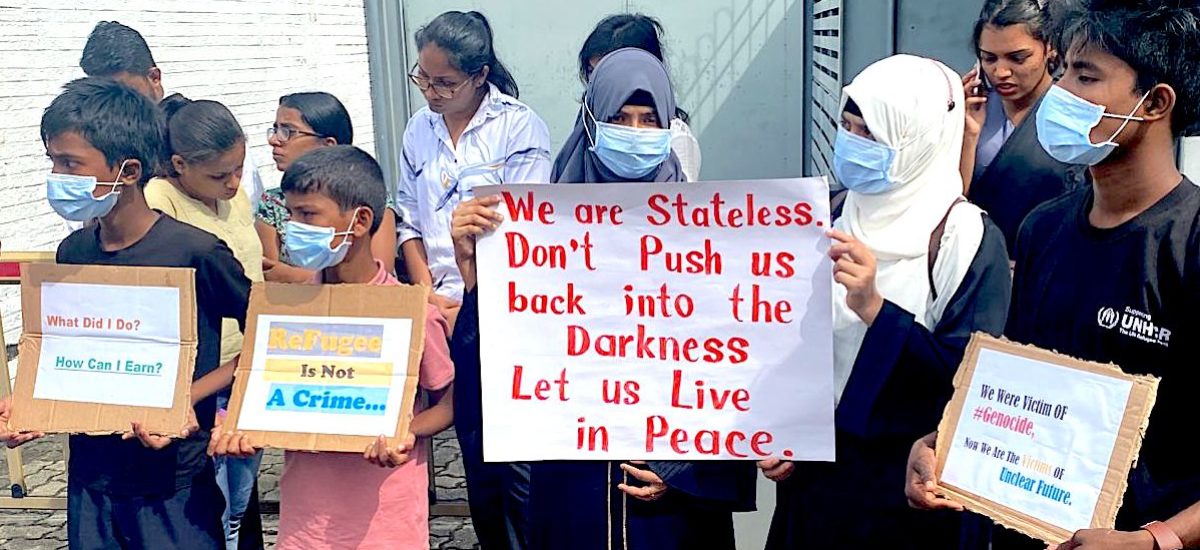Photo courtesy of Ruki Fernando
The UN High Commissioner for Refugees (UNHRC) and UN country team in Sri Lanka must do their utmost to ensure that refugees and asylum seekers don’t end up being stateless or compelled to return to places where they may face persecution, violence and discrimination before the UNHCR closes down its office in Sri Lanka this year. A protest was held outside the UNHRC about the fate of refugees and asylum seekers to highlight these issues.
Concerns were also presented to Mr. Marc-Andre Franche, the UN Resident Coordinator and Office of the High Commissioner for Human Rights, in September 2023. But there has been no clear responses and refugees and asylum seekers are still without any resolution. They fear being homeless, starving, with children not having education and having no healthcare. In the long term, they are afraid of being stateless if no country offers them permanent resettlement.
It’s good that Sri Lankan government is allowing refugees and asylum seekers to stay here temporarily and provide limited healthcare. But Sri Lanka must do more for refugees, especially by allowing them to work legally. We must also offer full and free health care for all, free education to children, basic housing and food. Sri Lanka must offer permanent resettlement to at least few refugees facing statelessness. The country has only about 800 refuges and asylum seekers out of about 42 million in the world and we must contribute to address this massive global humanitarian problem. Our hospitality will be measured by how we treat vulnerable people who come to us seeking support and care.
In December 2022, fishermen in northern Sri Lanka alerted the navy about a boat in distress adrift in the sea. The navy rescued a group of 104 people from the boat. The navy has referred to them as Myanmar nationals while a statement from UNHCR refers to them as Rohingya refugees. The Rohingya Muslims are stateless and many have fled and continue to flee from persecution in Myanmar. Many Rohingya refugees are also reported to be leaving refugee camps in Bangladesh due to overcrowding and the lack of facilities.
The rescued people were handed over to the police, produced before the Mallakam Magistrate in the Jaffna district and detained as “suspects” in the Jaffna prison. It is not clear under what legal provisions they were detained or what crime they (including children) were suspected of, especially since they had not landed illegally or even tried to enter Sri Lanka illegally but had been brought in by the navy who had rescued them from a boat in distress. A navy spokesperson is reported to have stated that “this is not a criminal action”.
The imminent scaling down of UNHCR operations in Sri Lanka (some are calling it a closure) has worsened fears of refugees and asylum seekers whose lives have always been full of insecurity, fear and uncertainty about the present and the future. After having fled persecution in their own countries, some have faced re-displacement and evictions, detention and various forms of hostility during their stay in Sri Lanka. In the past there have been instances of deportations, including from the airport. They have also been struggling to survive in Sri Lanka with difficulties to find essential needs such as educating children, food, housing and medicine. The prohibition on engaging in meaningful employment have affected them financially and also in terms of mental health. According to UNHCR, as of February 28, 2023, 845 asylum seekers and refugees were reported to have been in Sri Lanka. But this excludes a few whose asylum claims have been rejected by UNHCR and those who are awaiting processing of their applications in the Canadian private sponsorship program.
A major concern of refugees recognised by UNHCR is speedy permanent resettlement with some refugees having been in Sri Lanka for about 10 years. In recent times, UNHCR has informed some refugees that it would not be able to facilitate permanent resettlement. Despite some recent increases, the monthly allowance the refugees get from UNHCR is inadequate for dignified living, especially in context of the massive increase in cost of living.

